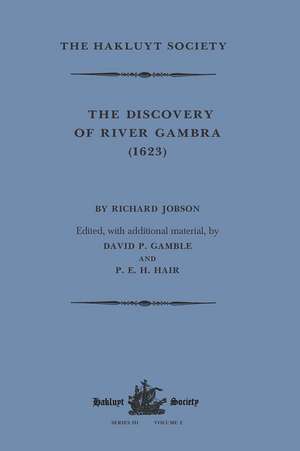The Discovery of River Gambra (1623) by Richard Jobson: Hakluyt Society, Third Series
Autor Richard Jobson Editat de David P. Gamble, P. E. H. Hairen Limba Engleză Paperback – 29 apr 2022
Din seria Hakluyt Society, Third Series
- 9%
 Preț: 869.53 lei
Preț: 869.53 lei -
 Preț: 311.47 lei
Preț: 311.47 lei -
 Preț: 312.51 lei
Preț: 312.51 lei -
 Preț: 312.09 lei
Preț: 312.09 lei -
 Preț: 297.54 lei
Preț: 297.54 lei - 9%
 Preț: 937.14 lei
Preț: 937.14 lei -
 Preț: 311.41 lei
Preț: 311.41 lei - 9%
 Preț: 942.92 lei
Preț: 942.92 lei -
 Preț: 324.57 lei
Preț: 324.57 lei -
 Preț: 311.80 lei
Preț: 311.80 lei -
 Preț: 312.86 lei
Preț: 312.86 lei -
 Preț: 324.37 lei
Preț: 324.37 lei -
 Preț: 314.06 lei
Preț: 314.06 lei -
 Preț: 299.74 lei
Preț: 299.74 lei -
 Preț: 312.09 lei
Preț: 312.09 lei -
 Preț: 317.78 lei
Preț: 317.78 lei -
 Preț: 316.29 lei
Preț: 316.29 lei -
 Preț: 315.29 lei
Preț: 315.29 lei -
 Preț: 316.87 lei
Preț: 316.87 lei -
 Preț: 309.70 lei
Preț: 309.70 lei -
 Preț: 312.61 lei
Preț: 312.61 lei
Preț: 313.67 lei
Nou
Puncte Express: 471
Preț estimativ în valută:
60.02€ • 64.18$ • 50.04£
60.02€ • 64.18$ • 50.04£
Carte tipărită la comandă
Livrare economică 18 aprilie-02 mai
Preluare comenzi: 021 569.72.76
Specificații
ISBN-13: 9781032319421
ISBN-10: 1032319429
Pagini: 368
Dimensiuni: 174 x 246 x 25 mm
Greutate: 0.67 kg
Ediția:1
Editura: Taylor & Francis
Colecția Hakluyt Society
Seria Hakluyt Society, Third Series
Locul publicării:Oxford, United Kingdom
ISBN-10: 1032319429
Pagini: 368
Dimensiuni: 174 x 246 x 25 mm
Greutate: 0.67 kg
Ediția:1
Editura: Taylor & Francis
Colecția Hakluyt Society
Seria Hakluyt Society, Third Series
Locul publicării:Oxford, United Kingdom
Cuprins
The Discovery of River Gambra (1623) by Richard Jobson
Notă biografică
Richard Jobson, David P. Gamble and P.E.H. Hair
Descriere
In 1623 Richard Jobson published an account of a 1620-1621 English voyage up River Gambra, during which a party, led by himself, penetrated to a point some 460 miles up-river. The purpose of the voyage was to make contact with the gold trade of the West African interior, but in this there was little success. However, Jobson’s account of the river, its commerce, natural history, peoples, religions and polities, was the earliest to appear in print, in this fullness of detail, in any language. It was also the earliest detailed account of any part of Black Africa, by an Englishman. Jobson’s account, almost entirely original, has special interest in its author’s observations on the African scene, particularly those on the African peoples and individuals encountered. Jobson discusses such topics as local agriculture and trade, the role of Islam, political culture, and the position of women. Despite the limits of his experience, his observations are seemingly accurate and generally perceptive, as well as being (perhaps unexpectedly) often tolerant and even sympathetic.
